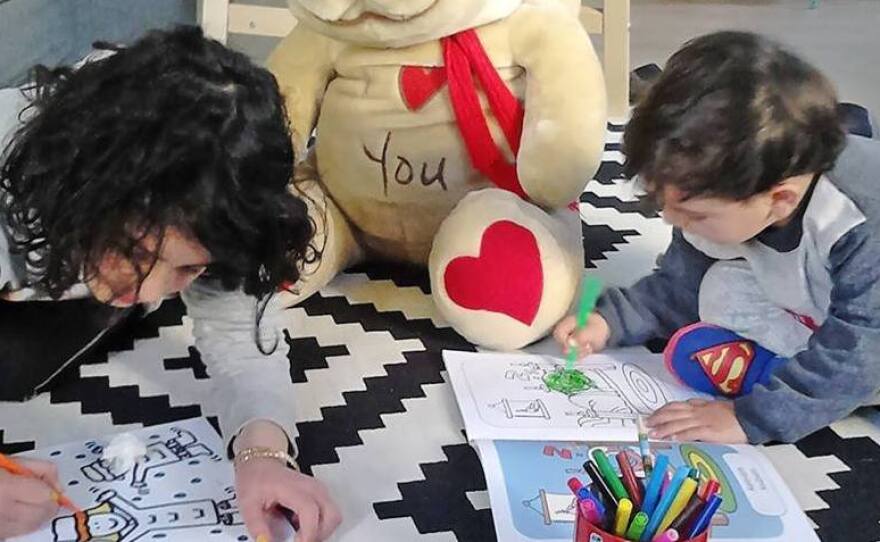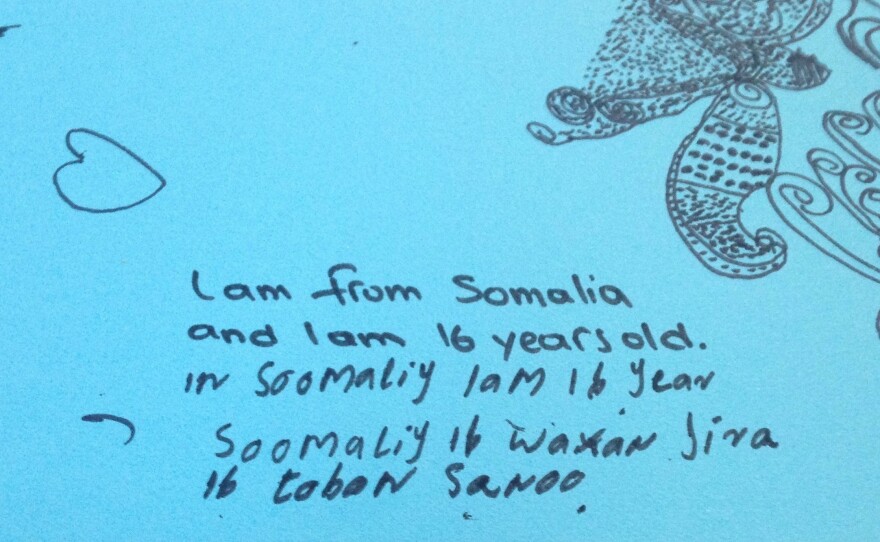

Three teenage boys are lugging boxes of donated shoes into a stately neoclassical home in Mytilini, the capital of the Greek island of Lesbos.
Two of the boys are Syrian, and the other is Algerian. For the moment, they live in this house, a shelter for underage asylum-seekers traveling alone.
Inside, Christina Dimakou, a high-energy young lawyer, greets them. "Kalimera!" she says, Greek for "good day" and flashes a smile. The boys repeat the word, giggling.
Dimakou, 30, is a guardian for unaccompanied minors, the official term for migrant children traveling alone. She works for Metadrasi, a Greek nonprofit that also runs this shelter, which also has social workers, psychologists and interpreters on duty.
"In Greece, unaccompanied minors don't have legal guardians, at least on a practical level," she says. "There is a provision in the law that says the district attorney of the region must be the guardian. But he is just responsible for signing paperwork ... he never meets them personally."
So Metadrasi created this guardian program to help kids with issues such as registration and asylum requests.
"Children need someone to explain to them what applying for asylum means, for instance," Dimakou says. "They need to know their options. They need to feel safe. Because no matter how strong they are ... they have to be taken care of."
The great migration of asylum-seekers to Europe includes thousands of unaccompanied children, children who risk being exploited. Their first stop in the European Union is often Lesbos.
Dimakou left a career in law in Athens to work with migrant children. Most are between 11 and 17 years old. But she's also met a few who are younger.
"I remember a 9-year-old Syrian girl traveling with her 4-year-old brother," she says, and her voice softens. "Their mother was in Greece with her older son and had wanted to bring the two younger ones legally. But she got tired of waiting. So she asked a Syrian family at a refugee camp in Turkey to bring them."
Dimakou took in the children at the house and checked out the mother, to make sure she really was their mother. The next day, the family reunited after four-and-a-half months apart.
Most children don't stay in Greece. They often just stay a few days in the safe house on Lesbos.
The 17-year-old Algerian boy, his baseball cap on sideways, calls himself Napoli and says he's trying to get to France, where he speaks the language but knows no one.
"My parents are dead," he says through an interpreter. "So I'm all alone, and I don't have brothers and sisters. I got nothing to do in [Algeria.] So I left."
Dimakou can't convince him to stay in Greece, where work is hard to find.
"If you cannot provide for them here, you can never convince them to stay," she says. "Because what they're asking is, 'What is my future?' "
With borders closing in Europe to North African migrants, it's not even clear if Napoli will even get to France.
The journey to northern Europe, which currently winds through Macedonia, Serbia, Croatia and Slovenia, is rife with risks, especially for girls traveling alone.
"Trafficking is my main concern," Dimakou says. "What I'm telling them is never go away with anyone if it's not a parent, a brother, a cousin or someone you trust and know since you're 2 years old."
If she can't persuade them to stay in another safe house in Greece, she tries to verify that the people they're going to meet in other countries are legitimate.
She warns them about people who say, "You can pay me for the journey later."
"You can't imagine how it is at 3 o'clock in the morning to receive messages on your cellphone, on WhatsApp and Viber, from children that are asking for help from somewhere else in Europe," she says. "And the only answer that you can give them is, 'I don't have the power to help you there.' "
She worries about the vulnerability of a withdrawn Somali girl in a brown headscarf who gives her name as Ayana. She draws flowers and hearts on a blue posterboard and writes out the few English words she knows.
"I love you," she says quietly, her eyes fixed on the posterboard.
Ayana won't say where she wants to go. But Ali, a baby-faced 17-year-old from Homs, Syria, doesn't hesitate when I ask him. "Germany," he says firmly. He wants to reunite with his best friend there.
Through an interpreter, he explains that his parents are in a refugee camp in Lebanon.
"There is no work in Lebanon, so I didn't want my family to support me all the time," he says. "So I decided to go and find a job and work."
But tonight, at the Metadrasi safe house in Mytilini, Ali, Ayana and Napoli are just being kids. In a living room with wall paintings of Superman and Spiderman, they count loudly in English as they bounce around a Nerf ball with the other children here, who include two tiny Afghan sisters who grew up as refugees in Iran.
Burgers and fries have just been delivered. And everyone, including Christina Dimakou, is laughing.
"I'm really looking forward to the day where I'm going to walk around some city in Europe and meet one of these little guys, these little women again," she says. "They will have gone to university or they will be working. I will ask them, 'How are you, dears?' And they will say, 'I am fine.' And they will really mean it."
Copyright 2016 NPR. To see more, visit http://www.npr.org/.






